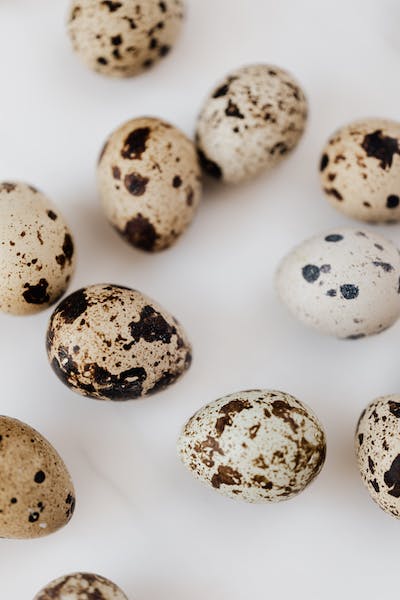Egg Facts: 15 Surprising Things You Didn’t Know About Eggs
egg recipes, egg nutrition, egg benefits, egg facts, egg hacks, egg storage, egg substitutes, egg allergy, egg art, egg crafts
Eggs are one of the most common and versatile foods in the world. They are a staple in many cuisines and cultures, and they can be prepared in countless ways. But how much do you really know about eggs? In this blog post, we will reveal 15 surprising facts about eggs that will make you appreciate them even more.

- Eggs
 come in different colours, not just white and brown. Depending on the breed of the chicken, eggs can have shells that
come in different colours, not just white and brown. Depending on the breed of the chicken, eggs can have shells that  are blue, green, pink, or even speckled. The colour of the shell has no effect on the taste or quality of the egg, but it may indicate the type of feed and environment the chicken was raised in1.
are blue, green, pink, or even speckled. The colour of the shell has no effect on the taste or quality of the egg, but it may indicate the type of feed and environment the chicken was raised in1. - Eggs are one of the few natural sources of vitamin D. Vitamin D is essential for your bone health and immune system, and it can also help prevent depression and certain cancers. One large egg provides 43.5 IU of vitamin D, which is 11% of the daily value2. However, not all eggs have the same amount of vitamin D. Eggs from chickens that are exposed to sunlight or fed vitamin D-enriched feed have higher levels of this nutrient than eggs from chickens that are kept indoors or fed regular feed.
- Eggs have a long shelf life, but not as long as you might think. Eggs can last for several weeks in the refrigerator, but they will lose some of their freshness and quality over time. The best way to tell if an egg is still good is to do the float test: Fill a bowl with cold water and gently place the egg in it. If the egg sinks to the bottom and lies flat, it is fresh. If the egg sinks but stands on one end, it is still edible but not as fresh. If the egg floats to the surface, it is spoiled and should be discarded.
-

Eggs Allergenic for Children Eggs are one of the most allergenic foods, especially for children. Eggs can cause allergic reactions in some people, ranging from mild symptoms like hives and itching to severe ones like anaphylaxis and breathing difficulties. Eggs are one of the eight major food allergens in the United States, and they are the second most common food allergy in children after milk. About 2% of children are allergic to eggs, but most of them outgrow the allergy by the age of 16.

- Eggs are a complete protein source, meaning they contain all nine essential amino acids. Amino acids are the building blocks of proteins, which are vital for the growth and repair of your muscles, tissues, and organs. One large egg provides about 6.5 grams of protein, which is 13% of the recommended daily intake for adults2. Eggs are also rich in other nutrients, such as healthy fats, choline, selenium, folate, and vitamin B12.

- Eggs can help you lose weight and maintain a healthy weight. Eggs are a low-calorie and high-satiety food that can help you feel full and satisfied for longer. This can reduce your hunger and calorie intake, which can aid your weight loss and management. Research has shown that eating eggs for breakfast can increase your satiety and decrease your food intake throughout the day compared to other breakfast options34.
- Eggs can improve your brain function and mood. Eggs are a rich source of choline, which is a key component of the neurotransmitter acetylcholine. Acetylcholine is responsible for your memory, learning, and mood regulation. Studies have suggested that eating eggs can improve your cognitive performance and mood, especially in older adults and pregnant women56.
- Eggs can protect your eye health and vision. Eggs contain two carotenoids, lutein and zeaxanthin, which are concentrated in your retina. These carotenoids act as antioxidants and filters that protect your eyes from harmful blue light and oxidative damage. Studies have indicated that eating eggs can increase your blood levels of lutein and zeaxanthin, which can lower your risk of age-related macular degeneration (AMD) and cataracts.

- Eggs can vary in size, shape, and weight. The size of an egg depends on several factors, such as the breed, age, and diet of the chicken, as well as the season and environment. The USDA classifies eggs into six sizes based on their minimum weight per dozen: jumbo (30 oz), extra large (27 oz), large (24 oz), medium (21 oz), small (18 oz), and peewee (15 oz). The shape and weight of an egg can also vary within the same size category.
- Eggs can be cooked in many different ways, but some methods are healthier than others. The way you cook your eggs can affect their nutritional value and health effects. For example, boiling, poaching, and scrambling eggs without added fat are healthier options than frying or baking them with butter, oil, or cheese. Cooking eggs at high temperatures or for long durations can also reduce the bioavailability of some nutrients, such as protein, choline, and lutein. It can also increase the formation of cholesterol oxidation products (COPs), which are harmful compounds that may increase your risk of cardiovascular disease and cancer.
-

Eggs. Hair Care Eggs can be used for more than just eating. Eggs have many other uses besides being a delicious and nutritious food. For instance,

Eggs. Face Care eggs can be used as a natural hair conditioner, a facial mask, glue, paint, a leather cleaner, a fire extinguisher, and gardening fertilizer. Eggs can also be used for various crafts and experiments, such as making slime, blowing bubbles, creating crystals, and making volcanoes.
- Eggs can be preserved in different ways, such as freezing, dehydrating, pickling, and curing. Eggs can be stored for longer periods of time by using various preservation methods. Freezing eggs can extend their shelf life for up to a year, but they need to be cracked and mixed before freezing. Dehydrating eggs can make them last for several years, but they need to be rehydrated before use. Pickling eggs can give them a tangy flavour and a firm texture, but they need to be refrigerated after opening. Curing eggs can enhance their flavour and colour, but they need to be rinsed and dried before use.13. Eggs can be pasteurized to kill harmful bacteria and extend their shelf life. Pasteurization is a process that involves heating eggs to a certain temperature for a certain time to destroy any pathogens that may be present, such as Salmonella. Pasteurized eggs are safer to eat raw or lightly cooked, and they can last longer in the refrigerator than unpasteurized eggs. Pasteurized eggs can be bought in liquid, frozen, or dried form, or they can be pasteurized at home using a sous vide machine or a microwave.
- Eggs can be used to test the freshness of baking soda and baking powder. Baking soda and baking powder are common leavening agents that help baked goods rise and become fluffy. However, they can lose their potency over time and affect the quality of your baking. To test if your baking soda or baking powder is still fresh, you can use eggs as a simple indicator. For baking soda, mix a teaspoon of it with a quarter cup of vinegar. If it bubbles vigorously, it is still good. For baking powder, mix a teaspoon of it with a quarter cup of hot water. If it bubbles moderately, it is still good.

Eggs. Art -

Eggs. Art Eggs can be used to make art, such as eggshell mosaic, egg tempera, and pysanky. Eggs are not only edible but also artistic. Eggs can be used to create various forms of art, such as eggshell mosaic, egg tempera, and pysanky. An Eggshell mosaic is a technique that involves breaking eggshells into small pieces and

Eggs. Art. glueing them onto a surface to create a colourful pattern. Egg tempera is a type of paint that is made by mixing egg yolk with water and pigment. It is one of the oldest and most durable paints in history. Pysanky is a traditional Ukrainian art form that involves decorating eggs with wax and dye. It is a symbol of spring and rebirth.

Eggs. Art.
Summary:
Eggs are one of the most nutritious and versatile foods in the world. They contain a wide range of nutrients and health benefits that make them a superfood for your health. In this blog post, you will learn 15 surprising facts about eggs that will make you appreciate them even more. Some of the facts are:
- Eggs come in different colours, not just white and brown. The colour of the shell depends on the breed of the chicken and does not affect the taste or quality of the egg.
 Eggs are one of the few natural sources of vitamin D, which is essential for your bone health and immune system. However, the amount of vitamin D in eggs varies depending on the exposure to sunlight or the feed of the chicken.
Eggs are one of the few natural sources of vitamin D, which is essential for your bone health and immune system. However, the amount of vitamin D in eggs varies depending on the exposure to sunlight or the feed of the chicken.- Eggs have a long shelf life, but not as long as you might think. The best way to tell if an egg is still good is to do the float test: If the egg sinks to the bottom and lies flat, it is fresh. If the egg floats to the surface, it is spoiled.
- Eggs are one of the most allergenic foods, especially for children. About 2% of children are allergic to eggs, but most of them outgrow the allergy by the age of 16.
- Eggs are a complete protein source, meaning they contain all nine essential amino acids. They are
- also rich in other nutrients, such as healthy fats, choline, selenium, folate, and vitamin B12.
- Eggs can help you lose weight and maintain a healthy weight. They are a low-calorie and high-satiety food that can reduce your hunger and calorie intake. Eating eggs for breakfast can increase your satiety and decrease your food intake throughout the day.
- Eggs can improve your brain function and mood. They are a rich source of choline, which is a key component of the neurotransmitter acetylcholine. Acetylcholine is responsible for your memory, learning, and mood regulation.
- Eggs can protect your eye health and vision. They contain two carotenoids, lutein and zeaxanthin, which are concentrated in your retina. These carotenoids act as antioxidants and filters that protect your eyes from harmful blue light and oxidative damage.
-

Eggs. Eggs can vary in size, shape, and weight. The size of an egg depends on several factors, such as the breed, age, and diet of the chicken, as well as the season and environment. The USDA classifies eggs into six sizes based on their minimum weight per dozen: jumbo, extra large, large, medium, small, and peewee.
- Eggs can be cooked in many different ways, but some methods are healthier than others. Boiling, poaching, and scrambling eggs without added fat are healthier options than frying or baking them with butter, oil, or cheese. Cooking eggs at high temperatures or for long durations can also reduce the bioavailability of some nutrients and increase the formation of harmful compounds.

- Eggs can be used for more than just eating. Eggs have many other uses besides being a delicious and nutritious food. For instance, eggs can be used as a natural hair conditioner, a facial mask, glue, paint, a leather cleaner, a fire extinguisher, and a gardening fertilizer. Eggs can also be used for various crafts and experiments, such as making slime, blowing bubbles, creating crystals, and making volcanoes.

Eggs. Hair Care - Eggs can be preserved in different ways, such as freezing, dehydrating, pickling, and curing. Eggs can be stored for longer periods by using various preservation methods. However, they need to be prepared differently before use depending on the method.
- Eggs can be pasteurized to kill harmful bacteria and extend their shelf life. Pasteurization is a process that involves heating eggs to a certain temperature for a certain time to destroy any pathogens that may be present, such as Salmonella. Pasteurized eggs are safer to eat raw or lightly cooked, and they can last longer in the refrigerator than unpasteurized eggs.
- Eggs can be used to test the freshness of baking soda and baking powder. Baking soda and baking powder are common leavening agents that help baked goods rise and become fluffy. However, they can lose their potency over time and affect the quality of your baking. To test if your baking soda or baking powder is still fresh, you can use eggs as a simple indicator.

Eggs can be used to make art, such as eggshell mosaic, egg tempera, and pysanky. Eggs are not only edible but also artistic. Eggs can be used to create various forms of art, such as eggshell mosaic, egg tempera, and pysanky. These are techniques that involve breaking, mixing, or decorating eggs with different materials to create colourful and unique patterns


